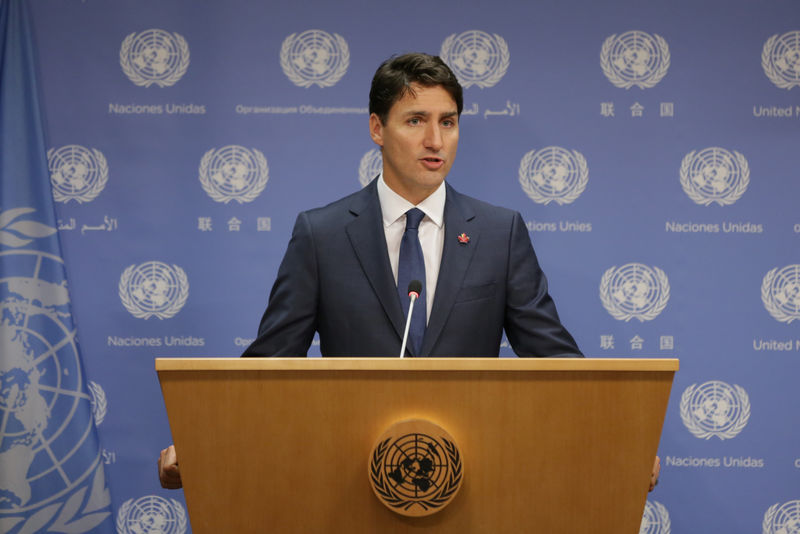By David Lawder
UNITED NATIONS (Reuters) - Canadian Prime Minister Justin Trudeau on Wednesday shrugged off U.S. pressure to quickly agree to a deal on NAFTA and indicated it was possible the three member nations might fail to conclude a new pact.
His comments cast further doubt on the future of the North American Free Trade Agreement, which underpins $1.2 trillion in annual trade between Canada, Mexico and the United States. Markets and business groups are openly fretting about the damage that a collapse could provoke.
The administration of U.S. President Donald Trump, which is demanding major changes to the 1994 treaty, has already concluded a text with Mexico and is threatening to leave out Canada unless it signs up by this Sunday.
"We will keep working as long as it takes to get to the right deal for Canada," Trudeau told reporters at the United Nations. He has repeatedly said he is ready to walk away from the talks rather than sign a document he thinks is bad.
The two sides are still far apart on major issues. Speaking separately, Canada's ambassador to Washington said that on a scale of 1 to 10, the chances of an agreement by the Sept 30 deadline were 5.
"If it doesn't happen by the end of the week, we'll just keep working away and trying to get the best deal for Canada," David MacNaughton told a Toronto event arranged by Politico Canada.
U.S. Trade Representative Robert Lighthizer on Tuesday had complained Canada was not making enough concessions and said time was running out.
Canadian officials say they do not believe Trump can rework NAFTA into a bilateral deal without the approval of Congress.
A Trump administration official said the text of the agreement with Mexico was set to be published on Friday.
The official declined to be named because the matter has not yet been made public. A spokesman for the U.S. Trade Representative's Office declined to comment.
Trump is threatening to impose tariffs on Canadian autos. Asked about the challenge this posed, Trudeau said Canada would need to feel confident "about the path forward as we move forward - if we do - on a NAFTA 2.0."
Trudeau said existing U.S. tariffs on Canadian steel and aluminum in late May would have to be scrapped before Canada felt comfortable signing a new NAFTA.
The two nations have also not settled disagreements over the future of a dispute settlement mechanism that Canada insists must remain. Lighthizer wants to scrap it.
"If you can't resolve disputes in a fair and balanced way, then what's the use of the agreement?" said MacNaughton.
The Trump administration has said the text of an agreement between the three nations is needed by Sunday to allow the current Mexican government to sign it before it leaves office at the end of November.
Asked what he would do if Canada were excluded, Trudeau said, "we will keep working on a broad range of alternatives." He did not give details.
MacNaughton said Lighthizer and Canadian Foreign Minister Chrystia Freeland were due to meet this week on the sidelines of a United Nations meeting in New York.

"It's really a question of whether or not the United States wants to have a deal. They know exactly what it is that we are prepared to do and what we need," he said. Freeland's office did not respond to a request for comment.